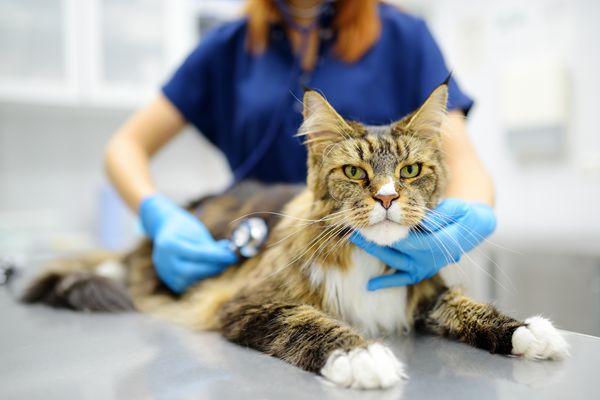
If you’ve ever caught your cat crouched low to the ground, neck extended, hacking like they’ve got a hairball, but nothing comes up, there’s a good chance it wasn’t just a hairball. May is Asthma Awareness Month and it’s a perfect time to discuss a disease that affects roughly 1%–5% of cats.
What is feline asthma?
Feline asthma is a chronic condition that affects a cat’s lower airways—the small tubes that carry air into the lungs. When an asthmatic cat breathes in something normally harmless, like pollen, dust, or mold, their body over-reacts to it.
This kind of response is called an allergic reaction, and it’s the same basic mechanism behind things like hay fever in people. The culprits that set off these reactions are known as allergens. These are everyday particles floating in the air that most animals ignore but can cause serious inflammation in cats (and people) with asthma. Common allergens include dust from cat litter, cigarette smoke, mold, household sprays, and even perfumes.
When a cat with asthma inhales one of these triggers, the lining of their airways swells up. Their airway muscles tighten, and mucus starts to build up. All that makes the airways narrower—so it’s suddenly much harder for your cat to breathe.
What are the signs my cat has asthma?
Cats are known for being private creatures, but asthma symptoms tend to give them away—if you know what to look for. If you see any of these big red flags, contact your veterinarian immediately:
- Coughing: This might look like your cat is trying to bring up a hairball.
- Wheezing: You may hear a whistling sound as they breathe.
- Labored or fast breathing: Especially after activity.
- Open-mouth breathing: This is never normal for cats and needs vet attention.
- Squatting with neck extended during a coughing spell
- Lethargy or less interest in play
- Bluish gums or tongue: A sign of low oxygen and a medical emergency.
How is asthma diagnosed?
Diagnosing asthma involves ruling out other causes of coughing or breathing trouble, like infections, heartworms, parasites, or even tumors. Vets may use a combination of the following tests:
- Blood tests (looking for high eosinophils, a type of white blood cell tied to allergies)
- Chest X-rays (to spot inflammation or trapped air)
- Bronchoscopy or lavage procedures (to collect samples from inside the lungs)
- Testing for heartworm and lung parasites
How is asthma treated?
While there’s no cure for feline asthma, treatment can make a huge difference. The main goals of treatment are reducing inflammation, opening the airways, and avoiding triggers. Most cats can live full lives with consistent care. Here’s what treatment might include:
Avoiding Triggers
Swap out dusty cat litter, avoid sprays or scented products, and clean regularly to reduce dust buildup. Air purifiers can help too.
Weight Management
If your cat is overweight, slimming down can ease strain on the lungs and decrease overall inflammation.
Medications
- Bronchodilators: Help open airways for easier breathing. Often given via inhaler/puffer.
- Corticosteroids: These reduce inflammation and can be given by injection, pill, or inhaler. Inhaled steroids work well with fewer side effects than systemic options.
- Combination inhalers: Pair a steroid with a bronchodilator.
Hypoallergenic Diets
Some cats benefit from diets designed to lower allergic responses, although it may take time to see results.
Can I help my cat live with asthma?
Caring for a cat with asthma is a bit like managing a chronic condition in humans—it takes attention and consistency. Keep a symptom diary, follow the treatment plan closely, and watch for signs of flare-ups. With the right approach, your cat can enjoy a happy, active life.
And since it’s Asthma Awareness Month, now’s the perfect time to check in on your pet’s health. Got questions? Don’t hesitate to talk to your vet.
Because when it comes to asthma—feline or otherwise—awareness is the first step to better breathing.

